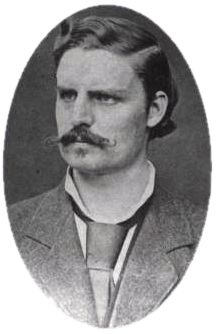Adolf Gaston Eugen Fick

Adolf Gaston Eugen Fick (February 22, 1852, Marburg – February 11, 1937, Herrsching am Ammersee) was a German ophthalmologist who invented the contact lens. He was the nephew of the German physiologist Adolf Eugen Fick, and the son of the German anatomy professor Franz Ludwig Fick.
At three years old, his mother died, and at six, his father, anatomy professor Ludwig Fick, died. Soon afterwards, he was raised in Adolf Fick's family; Adolf Fick was his uncle, godfather, and a famous physiologist that influenced his studies in ophthalmology. He studied medicine in Würzburg, Zürich, Marburg, and Freiburg. In 1884, Fick traveled to Germany to Marry Marie, the daughter of Johannes Wislicenus; he later had eight children with her.[1]
In 1888, he constructed and fitted what was to be considered the first successful model of a contact lens: an afocal scleral contact shell made from heavy brown glass, which he tested first on rabbits, then on himself, and lastly on a small group of volunteers. It was considered the first successful model of a contact lens. His idea was advanced independently by several innovators in the years that followed.
During World War I, Fick headed the field hospitals in France, Russia and Turkey. At the same time he continued working on ophthalmologic anatomy and optics.
External links and sources
- Fick biography - The "Kontaktbrille" of Adolf Eugen Fick (1887)
- Fick biography - Contact Lens History, the overseas pioneers
References
- ↑ Efron N; Pearson R (October 1988). "Centenary celebration of Fick's Eine Contactbrille". Arch Ophthalmol. 106: 1370–1377. doi:10.1001/archopht.1988.01060140534019.